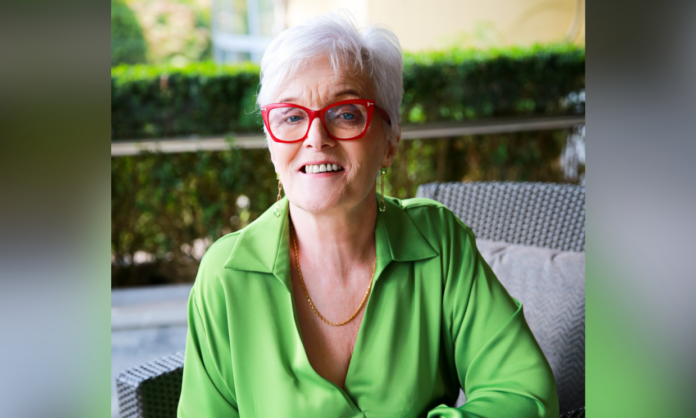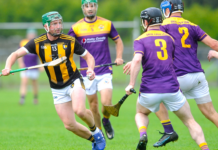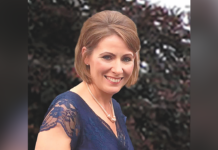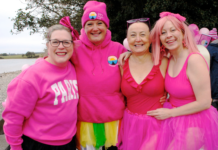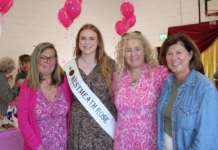In 2020, a Ballinagore woman became the first person in the world to receive a gene-editing treatment, and thereby saving her life.
Ann Deegan was diagnosed with hereditary amyloidosis, otherwise known as Donegal Amy due to its prevalence in North West Donegal. Without treatment, the retired nurse says she would be dead, but today, she is a fit and healthy grandmother who loves life, exercising and spending time with her family.
Ann has spoken about her story to highlight World Amyloidosis Day on October 26 last, to raise awareness of the rare disease, the symptoms to look out for and to show there is life after diagnosis.
“I rarely talk about being sick, it doesn’t define me, but if this helps someone it will be worth it,” she said. “With amyloidosis, knowledge is power. There are so many treatments out there now but you need to know what to look out for. Knowing the symptoms, taking the information to your GP and getting a diagnosis are key to a successful outcome. Early diagnosis offers the very best chance.”
Amyloidosis
Amyloidosis Ireland defines amyloidosis as “the name for a group of rare, serious diseases that occur when an abnormal protein called amyloid builds up on organs, nerves and tissues. As the amyloid accumulates, it interferes with their normal function.”
Around seven years ago, Ann started to experience symptoms including shortness of breath, heart palpitations, tiredness, bowel issues and electric-shock type pains in her limbs, particularly her hands and feet. She had received surgery for carpal tunnel syndrome in 2009 but her medical team hadn’t yet made the connection.
“I had a family history – Mum died in 1995, less than three years after her diagnosis. She had terrible nerve pain, I still remember her suffering. I was diagnosed on the 19th of October, 2019 but I wasn’t surprised. I knew I had it. They started me on a tablet to stop the protein developing in the liver. I was going over and back to the National Amyloidosis Centre in London.
Drug Trial
“It was when I was going back in 2020 for my annual checkup, I got a call from the consultant to say they had a new gene-editing drug trial called CRISPR. I was the first in the world to even be considered for it. My daughter is a pharmacist who said, ‘Mammy, it’s life changing, you have to go for it.’ She spoke to the consultant for me and I decided to do it, right in the middle of Covid, which was scary.”
After three weeks of gruelling tests and screening that pushed her to her max, Ann received an intravenous infusion of the gene-editing treatment over two hours. This would change her life.
“The treatment targets the liver, where the protein is developed – think of a cut and paste job. Afterwards they check your blood for a particular protein called TTR, and that should be below a certain level. After first TTR protein levels fluctuated it was agreed that I be re-dosed to obtain maximum results. In May 2023, I was re-dosed and my TTR levels were reduced by 95%. I’m on this trial until 2026 so they will monitor me until then.”
New Treatments Since 2019, there has been an explosion of treatments for the condition according to Ann who believes that within ten years, the condition will be successfully treated with a pill.
“There are so many medications now that weren’t there even a few years ago, it’s absolutely brilliant. There’s a gene-editing treatment, gene silencers, Patiseran that was given in an infusion every three weeks, but has now been changed to an Amvutra injection every three months and there’s a daily tablet Tafamadis.
“Years ago when you were diagnosed you were told to pack your bags and go home, there was nothing they could do. The prognosis was very bad. Now, there are so many things they can do, but people need to know what to look for.”
New life
Since the treatment, Ann has seen a huge difference. She has a better quality of life, more energy and her cardiac symptoms are completely gone.
“If I didn’t have the treatment I wouldn’t be here. I have two children and six grandchildren and they love coming over to our house. My amyloidosis is hereditary meaning the children have a 50% chance of having it too. You can’t help but feel guilty about that but knowledge is power and the drugs are improving all the time.
Awareness
Ann became involved with Amyloidosis Ireland to help raise awareness of the condition and support those who have been diagnosed. She is an admin on their Facebook page.
“Typically, patients will have some of the following symptoms, unexplained weight loss, fatigue, shortness of breath, foamy urine, heart palpitations, swelling of the abdomen, ankles and legs, easy bruising, carpal tunnel syndrome. Don’t be afraid to talk to your GP about it. There is so much that can be done.”
World Amyloidosis Day is on Saturday, October 26. For more information see amy.ie


